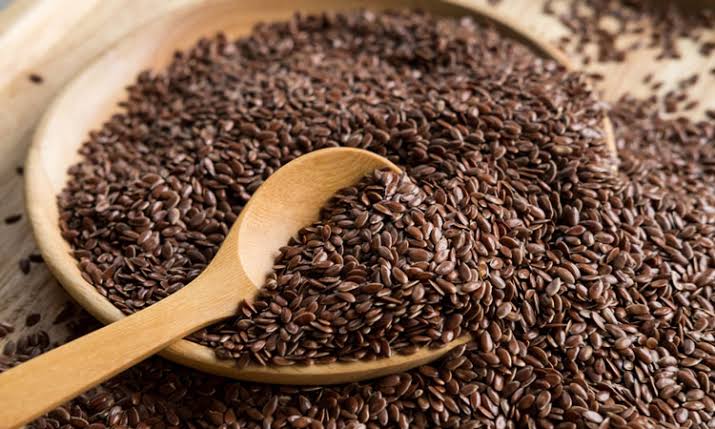Flaxseed is a plant-based food that is high in fiber, antioxidants, and omega-3 fatty acids. It’s referred to as a “functional food” because it can be consumed to improve one’s health.
Flax was a crop grown in ancient Egypt and China. It has been used in Ayurvedic medicine in Asia for thousands of years.
Flaxseed is now available in a variety of forms, including seeds, oils, powder, tablets, capsules, and flour. It’s used as a dietary supplement to help people avoid constipation, diabetes, high cholesterol, heart disease, cancer, and a variety of other ailments.
Lignans, antioxidants, fiber, protein, and polyunsaturated fatty acids like alpha-linolenic acid (ALA), or omega-3, are all found in flaxseed. These nutrients may help to reduce the risk of a variety of diseases.
However, there isn’t enough evidence to back up all of these claims right now. Learn more about flaxseed and its potential health benefits in this article.
Health benefits

Flaxseed contains a number of nutrients that may be beneficial to one’s health.
Flaxseed, like other plant-based foods, is high in antioxidants. These can help prevent disease by removing molecules from the body known as free radicals.
Natural processes and environmental pressures both produce free radicals. Oxidative stress can occur when there are too many free radicals in the body, resulting in cell damage and disease. Antioxidants aid in the elimination of free radicals from the body.
Lignans, which appear to have antioxidant properties, are abundant in flaxseed.
Flaxseed, according to some scientists, contains over 800 times more lignans than most other foods.
The sections that follow go over the potential health benefits of flaxseed in greater depth.
lowering the cancer risk
Omega-3 fatty acids are found in flaxseed. According to research, these may aid in the prevention of the growth of various types of cancer cells.
Flaxseed also contains lignans, which are antioxidants that prevent tumors from forming new blood vessels, potentially slowing tumor growth.
According to a 2013 study, women who ate flaxseed on a regular basis had a lower risk of breast cancer.
In addition, researchers concluded in 2018 that flaxseed may help reduce the risk of breast cancer after menopause.
Lignans are a type of phytoestrogen, a plant-based nutrient that has estrogen-like properties. Although there has been some concern that phytoestrogens may increase the risk of breast cancer, new research suggests they may actually protect against it.
Increasing cholesterol levels and improving heart health
To improve heart health, the American Heart Association (AHA) recommends eating more fiber and omega-3 fatty acids. Lignans may also aid in the prevention of cardiovascular disease. All of these nutrients can be found in flaxseed.
Phytosterols are also found in flaxseed. Phytosterols are similar to cholesterol in structure, but they help prevent cholesterol absorption in the intestines.
Phytosterols may thus aid in the reduction of low-density lipoprotein (LDL), or “bad,” cholesterol levels in the body.
Flaxseed’s effect on cholesterol levels in males with moderately high cholesterol was studied by researchers in 2010. For 12 weeks, participants took either a 20 milligram (mg) lignans capsule, a 100 milligram (mg) capsule, or a placebo.
After taking lignans, cholesterol levels dropped, especially in those who took the 100 mg capsules.
Flaxseed consumption lowered LDL cholesterol levels and helped the body remove fat, according to the authors of a 2012 study involving 17 people, though they note that the overall diet may also play a role. Dietary flaxseed, according to the researchers, may help lower cholesterol levels.
Omega-3 oils, which are found in oily fish, have also been linked to lower cardiovascular risk by some researchers. Flaxseed has been proposed as an omega 3 source alternative to marine sources by researchers. People who eat a plant-based diet may find it useful as a result of this.
Relieving the symptoms of arthritis
Flaxseed, according to the Arthritis Foundation, can help with joint pain and stiffness. It’s used to treat rheumatoid arthritis, lupus, and Raynaud’s phenomenon in some people.
They add that there isn’t enough evidence to back up its use for this purpose, but that flaxseed’s ALA may help reduce inflammation.
People can take it:
- ground (one tablespoon per day)
- as an oil (one to three tablespoons per day)
- in capsules (1,300–3,000 mg per day)
Reducing hot flashes
Flaxseed may help reduce the incidence or severity of hot flashes in women who are not on estrogen therapy during menopause, according to research published in 2007.
Further research by the same team in 2012, however, found that flaxseed did not make a difference.
Improved blood sugar levels
Lignans and other phytoestrogens may aid in the prevention of chronic conditions like diabetes.
For 12 weeks in 2013, scientists gave 25 people 0 g, 13 g, or 26 g of flaxseed. The participants all had prediabetes and were either obese or overweight men or women who had gone through menopause.
The 13 g dose appeared to lower glucose and insulin levels while improving insulin sensitivity, but the other doses did not.
In addition, a 2016 rodent study found that flaxseed compounds may help prevent type 1 diabetes and delay the onset of type 2 diabetes. However, these findings may not be applicable to humans.
For 12 weeks, 99 people with prediabetes were given 40 grams of flaxseed, 20 grams of flaxseed, or no flaxseed and no placebo. Flaxseed consumption appeared to lower blood pressure, but it had no effect on blood sugar levels or insulin resistance.
The effects of flaxseed on diabetes symptoms are still unknown.
Constipation prevention
Flaxseed contains insoluble fiber, which does not dissolve in water and remains in the digestive tract after consumption. It absorbs water and adds bulk there, which may aid regularity.
However, according to the National Center for Complementary and Integrative Health (NCCIH), there is little evidence that flaxseed aids in constipation relief.
Consuming flaxseed with insufficient water can worsen constipation and lead to intestinal blockage, according to the NCCIH.
Additionally, consuming too much flaxseed or flaxseed oil can result in diarrhea.
Reducing the impact of radiation
In 2013, researchers discovered evidence that flaxseed dietary lignans helped mice recover from radiation exposure.
When compared to mice who did not consume lignans, those who did had lower levels of inflammation, injury, oxidative damage, and fibrosis, as well as a higher survival rate.
If more human tests show similar results, flaxseed lignans could be used to treat lung problems caused by radiation or radiation therapy.
Other conditions
The NCCIH is currently funding research to see if the nutrients found in flaxseed can help with:
- ovarian cancer
- cardiovascular disease
- metabolic syndrome
- diabetes
- asthma
- inflammation
Uses of flaxseed in Ayurvedic medicine include:
- promoting overall health
- restoring the skin’s pH balance
- preventing chronic conditions, such as diabetes, atherosclerosis, and arthritis
- providing protection from cancer
Nutrition
A tablespoon of ground flaxseed weighing 7 g, according to the US Department of Agriculture, contains:
- energy: 37.4 calories
- protein: 1.28 g
- fat: 2.95 g
- carbohydrate: 2.02 g
- fiber: 1.91 g
- calcium: 17.8 mg
- magnesium: 27.4 mg
- phosphorus: 44.9 mg
- potassium: 56.9 mg
- folate: 6.09 micrograms (mcg)
- lutein and zeaxanthin: 45.6 mcg
A teaspoon of flaxseed contains trace amounts of several vitamins and minerals, but not in significant amounts. It also contains lignans, tryptophan, lysine, tyrosine, and valine, as well as mostly unsaturated fats that are good for you.
People should try to avoid whole flaxseed and eat it ground, as the intestines may not absorb the nutrients in whole flaxseeds.
Risks
Flaxseed’s nutrients may not be suitable for everyone. If you have any of the following symptoms, you should avoid flaxseed products or consult a doctor first:
- are using blood thinners, such as warfarin (Coumadin) or aspirin
- are using nonsteroidal anti-inflammatory drugs
- are using cholesterol-lowering drugs
- have hormone-sensitive breast or uterine cancer
- are pregnant or breastfeeding
- have an allergy to flaxseed
More generally, people who consume flaxseed should:
Avoid eating raw and unripe flaxseeds, as they may contain toxic compounds.
Consume flaxseed ground and with plenty of fluid, to prevent digestive problems.
Buy only small bottles of flaxseed oil in dark bottles and store them in the refrigerator, as the oil can spoil quickly. Also, do not use the oil after the expiration date on the label has passed.
Avoid heating flaxseed oil in cooking. Add the oil to already prepared dishes and avoid microwaving to reheat.
Dietary tips
People can use flaxseed ground, as an oil, or in capsules.
It’s also in convenience foods like muffins and other baked goods, pastas, snack bars, and milk alternatives.
Ground flaxseed can be used in a variety of dishes, including:
- breakfast cereals
- smoothies
- soups and stews
- salads and sandwiches
- yogurts
Instead of breadcrumbs, people can add a spoonful of flaxseeds to a muffin mix or use it to coat chicken.
Using too much flaxseed, on the other hand, can give food a bitter taste that some people dislike. Starting with small amounts and gradually increasing them according to taste is one option.
Conclusion
Flaxseed and flaxseed products, particularly lignans, are high in antioxidants. They may have some health benefits, but there isn’t enough evidence to back this up just yet.
Anyone considering using flaxseed should consult with a physician first to ensure that it is safe for them to do so.
A variety of flaxseed products are available for purchase online.
Sources
- Seeds, flaxseed. (2019).
https://www.ncbi.nlm.nih.gov/pmc/articles/PMC5808339/ - The American Heart Association diet and lifestyle recommendations. (2017).
https://www.heart.org/en/healthy-living/healthy-eating/eat-smart/nutrition-basics/aha-diet-and-lifestyle-recommendations - How healthful is flaxseed? https://www.medicalnewstoday.com/articles/263405







